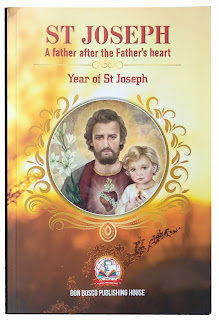Mary our Mother (Review)
This is a review of a series of homilies by Fr James Dabhi,
published in Third Millennium, XVIII
2015 3, July-September.
Fr James Dabhi published a series of reflections which he
preached during the novena leading up to the feast of Our Lady of Mount Carmel.
The first five reflections were published in this particular edition of Third Millennium. The reflections offer
interesting food for thought. I was however tickled by the very first
reflection which was entitled ‘Mother, our Intercessor’.
In this reflection, he tries to present Mary as an ideal
intercessor basing himself heavily on the incident at the wedding feast at Cana . With the idea of Mary as intercessor I have no
contention but I do disagree with some of the matter he used to build up this
theme. He states that Jesus introduced Mary at the most critical moment of His
life-his crucifixion. My first difficulty is with the word ‘introduced’. I do
not think that Jesus ‘introduced’ Mary as much as he ‘affirmed’ her and her
role. Fr James calls the crucifixion a history-making moment, and rightly so
but I feel he has theologically exaggerated the event to emphasize a special
role given to Mary. This is evident from the phrase “Jesus knew the best moment
to introduce his mother”. He contrasts this moment with the episode of the
wedding at Cana . He feels that the latter
would have been a more “gleeful occasion” to introduce Mary. Here I beg to
differ again. Why should Jesus ‘introduce’ Mary at all? What purpose does such
an introduction serve? Whoever has heard of a public figure go around
introducing his family members? ‘Public figure’ may sound too secular. It can
be replaced with ‘religious leader’, ‘priest’, ‘religious’, ‘evangelist’, ‘preacher’ and like terms.
On the cross, I do not believe that Jesus ‘introduced’ Mary
as his mother or as ours. What he did was make a social arrangement for Mary.
This reminds me of the incident at Nain (Lk 7:11-17). The widow was helpless
and her condition hopeless. She had no one to look after her. She was at the
mercy of people’s charity. Mary would have had a similar fate. One might argue
that she could have gone to her relatives but then again she would be at their
mercy. So, he entrusted her to someone he trusted-his disciple, John.
You have heard it said and it has been said for as long as I
can remember that Mary became our mother after Jesus gave her to John. I am not
fully convinced about this. If Jesus truly was the Word ‘who was with God’ and
who ‘was God’ and through whom all things came to be (Jn 1:1,3) then Mary
becomes not just ‘Mother of God’, ‘Mother of Christ’ or ‘Mother of the Creator’
as the litany of Loreto proclaims. She receives an epithet which is not found
in the Litany but which is used be Pope Francis in his encyclical Laudato Si-Mother of all creation
(#241). This implies that Mary is not just our mother but she is mother to all.
Secondly, it also implies that Mary’s universal motherhood did not originate in
Jesus’ words “Behold your mother” (Jn 19:27) but rather in her fiat: “May it be done to me according to
your word” (Lk 1:38).
Another difficulty I had was with what the author said about
the resurrection being proof of the gift of Mary to John. I quote: “Jesus
offers His mother as the gift to John to be John’s mother. This truth will be
vindicated by His resurrection. Had Jesus not risen from the dead, His gift to
John would not have been proved true.” Why any proof is needed, I cannot
understand. Secondly, the connection between the resurrection and the gift of
Mary is obscure to me.
Apart from these few points I think that Fr Dabhi has done a
good job in presenting a Mariology. The themes are developed nicely and end
with an application to life.



Comments
Post a Comment